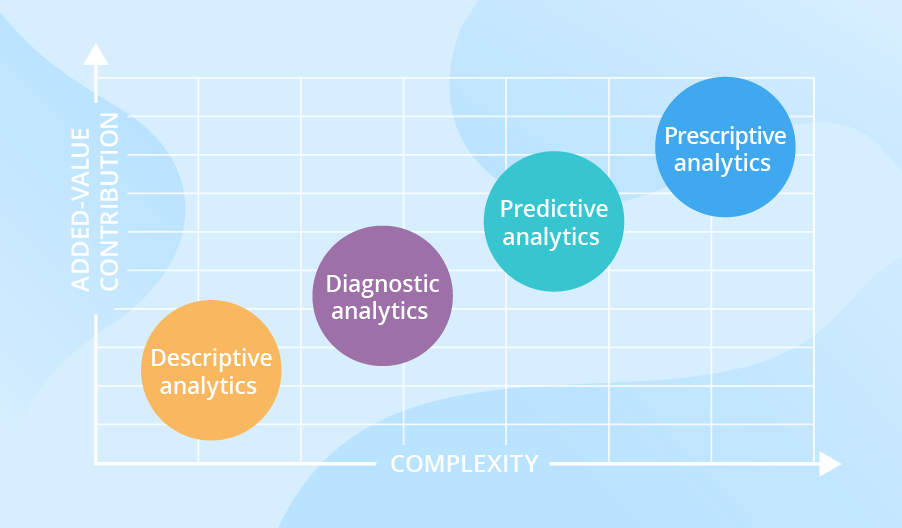
What are the 4 models of data analysis
Data without analytics doesn't make much sense, but analytics is a broad term that can mean a lot of different things depending on where you sit on the data analytics maturity model. Modern analytics tend to fall in four distinct categories: descriptive, diagnostic, predictive, and prescriptive.
What are the 4 purposes of data analysis
Various approaches to data analytics include looking at what happened (descriptive analytics), why something happened (diagnostic analytics), what is going to happen (predictive analytics), or what should be done next (prescriptive analytics).
What are the 5 data analytics
5 Types of Data Analytics to Drive Your BusinessDescriptive Analytics. Business intelligence and data analysis rely heavily on descriptive analytics.Diagnostic Analytics.Predictive Analytics.Prescriptive Analytics.Cognitive Analytics.
What are the three 3 kinds of data analysis
Three key types of analytics businesses use are descriptive analytics, what has happened in a business; predictive analytics, what could happen; and prescriptive analytics, what should happen.
What is the 4 V model of big data
These Vs stand for the four dimensions of Big Data: Volume, Velocity, Variety and Veracity.
What are the 4 types of models in modeling and simulation
Data analytics professionals should know these four types of simulation models:Monte Carlo method.Agent-based modeling.Discrete event simulation.System dynamic modeling.
What are main data analysis methods
The two primary methods for data analysis are qualitative data analysis techniques and quantitative data analysis techniques. These data analysis techniques can be used independently or in combination with the other to help business leaders and decision-makers acquire business insights from different data types.
What are the four Vs of data analysis
Big data is often differentiated by the four V's: velocity, veracity, volume and variety.
What is 4 big data analytics
There are four main types of big data analytics: diagnostic, descriptive, prescriptive, and predictive analytics.
What are the 6 phases of data analytics
According to Google, there are six data analysis phases or steps: ask, prepare, process, analyze, share, and act.
What are the 3 main data types
There are Three Types of DataShort-term data. This is typically transactional data.Long-term data. One of the best examples of this type of data is certification or accreditation data.Useless data. Alas, too much of our databases are filled with truly useless data.
What are the 3 most common data types
Common data types
| Data Type | Definition |
|---|---|
| String (str or text) | Sequence of characters, digits, or symbols—always treated as text |
| Boolean (bool) | True or false values |
| Enumerated type (enum) | Small set of predefined unique values (elements or enumerators) that can be text-based or numerical |
What are the 4 elements of big data
Big data is now generally defined by four characteristics: volume, velocity, variety, and veracity.
What are the 5 types of V in big data
The 5 V's of big data (velocity, volume, value, variety and veracity) are the five main and innate characteristics of big data.
What are the 4 types of system models
Further more like systems thinking, systems modeling in can be divided into:Systems analysis.Hard systems modeling or operational research modeling.Soft system modeling.Process based system modeling.
What are the four 4 components of successful modeling
Bandura described specific steps in the process of modeling that must be followed if learning is to be successful: attention, retention, reproduction, and motivation. First, you must be focused on what the model is doing—you have to pay attention.
What are the 6 methods of data collection and analysis
Some common data collection methods include surveys, interviews, observations, focus groups, experiments, and secondary data analysis. The data collected through these methods can then be analyzed and used to support or refute research hypotheses and draw conclusions about the study's subject matter.
What are the 3 data analysis steps
The three basic steps in the data analysis process are: assess the quality and reliability of the data, sort and classify data, and perform statistical tests and analyze the results.
What are the 4 Vs of Big data analytics
Most people determine data is “big” if it has the four Vs—volume, velocity, variety and veracity.
What are the 4 A’s of data
Big Data analysis currently splits into four steps: Acquisition or Access, Assembly or Organization, Analyze and Action or Decision. Thus, these steps are mentioned as the “4 A's”.
What is Level 4 data analyst
Collect, organise and study data to provide business insight. Qualification level 4. Equivalent to higher national certificate (HNC). Typical duration 24 months.
What are the 4 types of big data
4 types of big data technologiesData storage. Big data technology that deals with data storage has the capability to fetch, store, and manage big data.Data mining. Data mining extracts the useful patterns and trends from the raw data.Data analytics.Data visualization.
What are the 4 levels of analytics in big data
But it's not just access to data that helps you make smarter decisions, it's the way you analyze it. That's why it's important to understand the four levels of analytics: descriptive, diagnostic, predictive and prescriptive.
What are the five 5 key steps of data analysis process
article Data Analysis in 5 StepsSTEP 1: DEFINE QUESTIONS & GOALS.STEP 2: COLLECT DATA.STEP 3: DATA WRANGLING.STEP 4: DETERMINE ANALYSIS.STEP 5: INTERPRET RESULTS.
What are the 5 most common data types
Most modern computer languages recognize five basic categories of data types: Integral, Floating Point, Character, Character String, and composite types, with various specific subtypes defined within each broad category.


